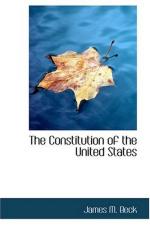This view as to the limitation of government and the denial of its omnipotence was powerfully accentuated in America by the very conditions of its colonization. The good yeomen of England who journeyed to America went in the spirit of the noble and intrepid Kent, when, turning his back upon King Lear’s temporary injustice, he said that he would “shape his old course in a country new.” Was it strange that the early colonists, as they braved the hardships and perils of a dangerous voyage, only to be confronted in the wilderness by disease, famine and massacre, should fall back for their own government upon these primal verities of human society, and claim not only their inherited rights as Englishmen, but also the peculiar privileges of pioneers in an unconquered wilderness?
This spirit of constitutionalism in America, which culminated in the Constitution of the United States, had its institutional origin in the spacious days of Queen Elizabeth. That wonderful age, which gave to the world not only Shakespeare, Spenser and Jonson, but also Drake, Frobisher and Raleigh, was the Anglo-Saxon reaction to the Renaissance. The spirit of man had a new birth and was breaking away from the too rigid bonds of ancient custom and authority.
Among the notable, but little known, leaders of that time was Sir Edwin Sandys, the leading spirit of the London (or Virginia) company. He was a Liberal when to be such was an “extra hazardous risk.” He was the son of a Liberal, for his father, a great prelate, had been sent to the Tower for preaching in defence of Lady Jane Grey. The son, Sir Edwin, was the foe of monopolies, and in the same Parliament that impeached the great genius of this Inn, Francis Bacon, Sandys advocated the then novel proposition that accused prisoners should have the right to be represented by counsel, to which the strange objection was made that it would subvert the administration of justice. As early as 1613, he had boldly declared in Parliament that even the King’s authority rested upon the clear understanding that there were reciprocal conditions which neither ruler nor subject could violate with impunity. He might not too fancifully be called the “Father of American Constitutionalism,” for he caused a constitution—possibly the first time that that word was ever applied to a comprehensive scheme of government—to be drafted for the little colony of Virginia in 1609 and amplified in 1612. Speaking in this venerable Hall, whose very walls eloquently remind us of the mighty genius of Francis Bacon, it is interesting to recall that these two charters of government, which were the beginning of Constitutionalism in America and therefore the germ of the Constitution of the United States, were put in legal form for royal approval by Lord Bacon himself. Thus the immortal Treasurer of this Inn is directly linked with the development of Constitutional freedom in America.
Bacon became a member of the council for the Virginia Company in 1609. His deep interest in it is attested in the dedication to him by William Strachey in 1618 of the latter’s Historie of Travaile into Virginia Brittania.




